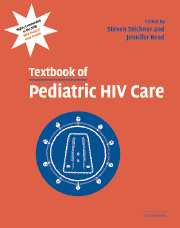Book contents
- Frontmatter
- Contents
- List of contributors
- List of abbreviations
- Foreword
- Preface
- Introduction
- Part I Scientific basis of pediatric HIV care
- Part II General issues in the care of pediatric HIV patients
- Part III Antiretroviral therapy
- Part IV Clinical manifestations of HIV infection in children
- Part V Infectious problems in pediatric HIV disease
- Part VI Medical, social, and legal issues
- 43 Clinical trials for HIV-infected children
- 44 Medical issues related to the care for HIV-infected children in the home, day care, school, and community
- 45 Contact with social service agencies
- 46 Disclosure
- 47 Psychosocial factors associated with childhood bereavement and grief
- 48 Legal issues for HIV-infected children
- Appendices
- Index
- Plate section
- References
46 - Disclosure
from Part VI - Medical, social, and legal issues
Published online by Cambridge University Press: 03 February 2010
- Frontmatter
- Contents
- List of contributors
- List of abbreviations
- Foreword
- Preface
- Introduction
- Part I Scientific basis of pediatric HIV care
- Part II General issues in the care of pediatric HIV patients
- Part III Antiretroviral therapy
- Part IV Clinical manifestations of HIV infection in children
- Part V Infectious problems in pediatric HIV disease
- Part VI Medical, social, and legal issues
- 43 Clinical trials for HIV-infected children
- 44 Medical issues related to the care for HIV-infected children in the home, day care, school, and community
- 45 Contact with social service agencies
- 46 Disclosure
- 47 Psychosocial factors associated with childhood bereavement and grief
- 48 Legal issues for HIV-infected children
- Appendices
- Index
- Plate section
- References
Summary
As increasing numbers of children with perinatally acquired human immunodeficiency virus type 1 (HIV) infection are surviving to ages at which they are developmentally ready to learn their diagnosis, the management of disclosure becomes an increasingly crucial component of medical, psychological, and social care [1, 2]. Even though much more is now understood about the transmission of HIV than when AIDS was first reported, most families still keep the diagnosis a closely guarded secret.
The decision to disclose an HIV diagnosis to a child is difficult and emotion-laden. Most parents do eventually disclose the diagnosis to their child, though some families or cultures are not as open about discussing personal subjects with their children as professionals might expect [3, 4].
Parents' perspectives: reasons cited for the decision not to disclose
A child diagnosed with HIV identifies an entire family at risk of infection [5]. Following a child's positive test result, the whole family is usually tested. In just a matter of days, the family's hopes and expectations for their future together are radically altered. Parents often keep the diagnosis a secret as they worry about a negative reaction by family. They may fear the psychological effect that disclosure might have on non-infected siblings and that (if disclosed to), the infected child may not be able to keep the information confidential [6–8].
- Type
- Chapter
- Information
- Textbook of Pediatric HIV Care , pp. 661 - 665Publisher: Cambridge University PressPrint publication year: 2005



